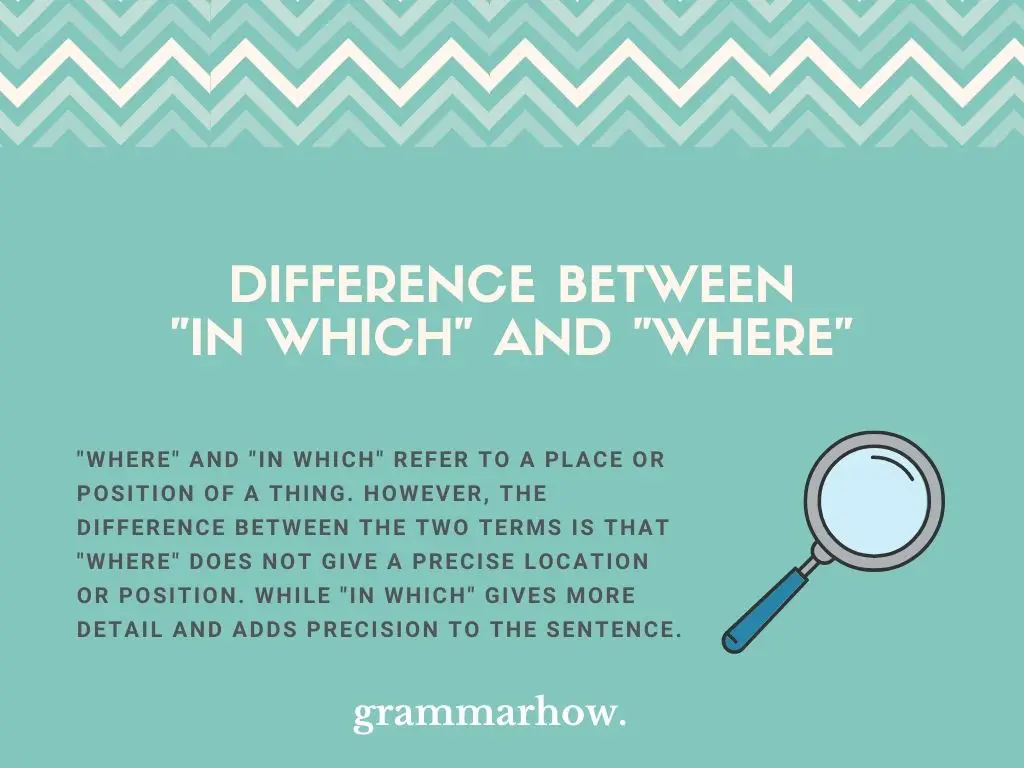“In which” vs. “where” are two similar terms used in English; however, what’s their difference? This article will explore their differences. This article will further explain the meaning of the expression “In Which” and the word “Where” and provide helpful examples of how to use them in a sentence.
Difference Between “In Which” and “Where”
“Where” and “In which” refer to a place or position of a thing. However, the difference between the two terms is that “where” does not give a precise location or position. While “In which” gives more detail and adds precision to the sentence.

The preposition “in” gives the phrase “In Which” its precision as opposed to the word “where”. Take, for example, If I say,
- This is the desk where I keep my books
I have not specified exactly how I kept my books on the desk. It could be on the desk or in the desk. But if I say,
- This is the desk in which I keep my books.
I have specified exactly where I keep my books, which are inside the desk.
Although they both have a slight difference, they can be used interchangeably, especially in an informal discussion. However, if you want to be more detailed with your description, it is suggested that you use “in which”.
What Does “In Which” Mean?
“In Which” is a phrase that is made up of the preposition “In” and the pronoun “Which”. “In Which” is used to talking about a particular place or time precisely. The expression is used in a situation where you have to specify the position of what you are talking about.
To illustrate the meaning of the phrase, here are a few examples to help give you an idea of how to use “in which” in a sentence:
- In my room, I have a drawer in which I store all of my files.
- This is the house in which I grew up
- That was the car in which I saw my sister the last time.
- There is a cupboard downstairs in which you will find all the items you need.
- This is the hostel in which she was found.
- We all have separate lockers in which we store our belongings.
Notice all the sentences stated, the phrase “in which” is used to specifically point out a particular place and the position of a thing.
What Does “Where” Mean?
The term “Where” is used to refer to a place or situation. The word is less position-specific than the phrase “In Which” but is actively used by people to talk about positions, places, and situations, especially in an informal conversation.
To give you a better insight, here are a few examples showing the proper way to use the word “where” in a sentence.
- She stays about ten miles from where she works.
- This is the place where I first met my husband.
- I cannot figure out where exactly I kept my shoes.
- Peter won’t stop talking about this restaurant where he was served the most amazing meal he had ever eaten.
- This is the house where I saw you the last time.
- This is the section of the farm where we plant vegetables.
- My office has a break room where we all have lunch.
Is “In Which” More Formal Than “Where”?
“In which” is more formal than “where”. It is rare to see people use the phrase “in which” in informal conversations. “Where” is the preferable option in informal writings, especially when using contractions such as “I’ve”, “I’m”, “We’re,” and so on.
For example, I would not say,
- Oh, I would love to see the house in which you were brought up.
This is obviously a casual conversation and the use of “in which” kind of adds an unnecessary formal tone. Instead, I would say,
- Oh, I would love to see the house where you were brought up.
The use of “Where” here gives it a lighter tone than the previous sentence.
Final Thoughts
It is not difficult to tell when to use “in which” and “where”. Just understand that “in which” is the preferred option to use in formal situations and also in situations where you have to specify the particular position of a place or thing.
You may also like:
“In Which”, “Of Which”, “At Which”, “To Which” – Usage Guide
“From Which” vs. “From Where” – Difference Explained

Martin holds a Master’s degree in Finance and International Business. He has six years of experience in professional communication with clients, executives, and colleagues. Furthermore, he has teaching experience from Aarhus University. Martin has been featured as an expert in communication and teaching on Forbes and Shopify. Read more about Martin here.
